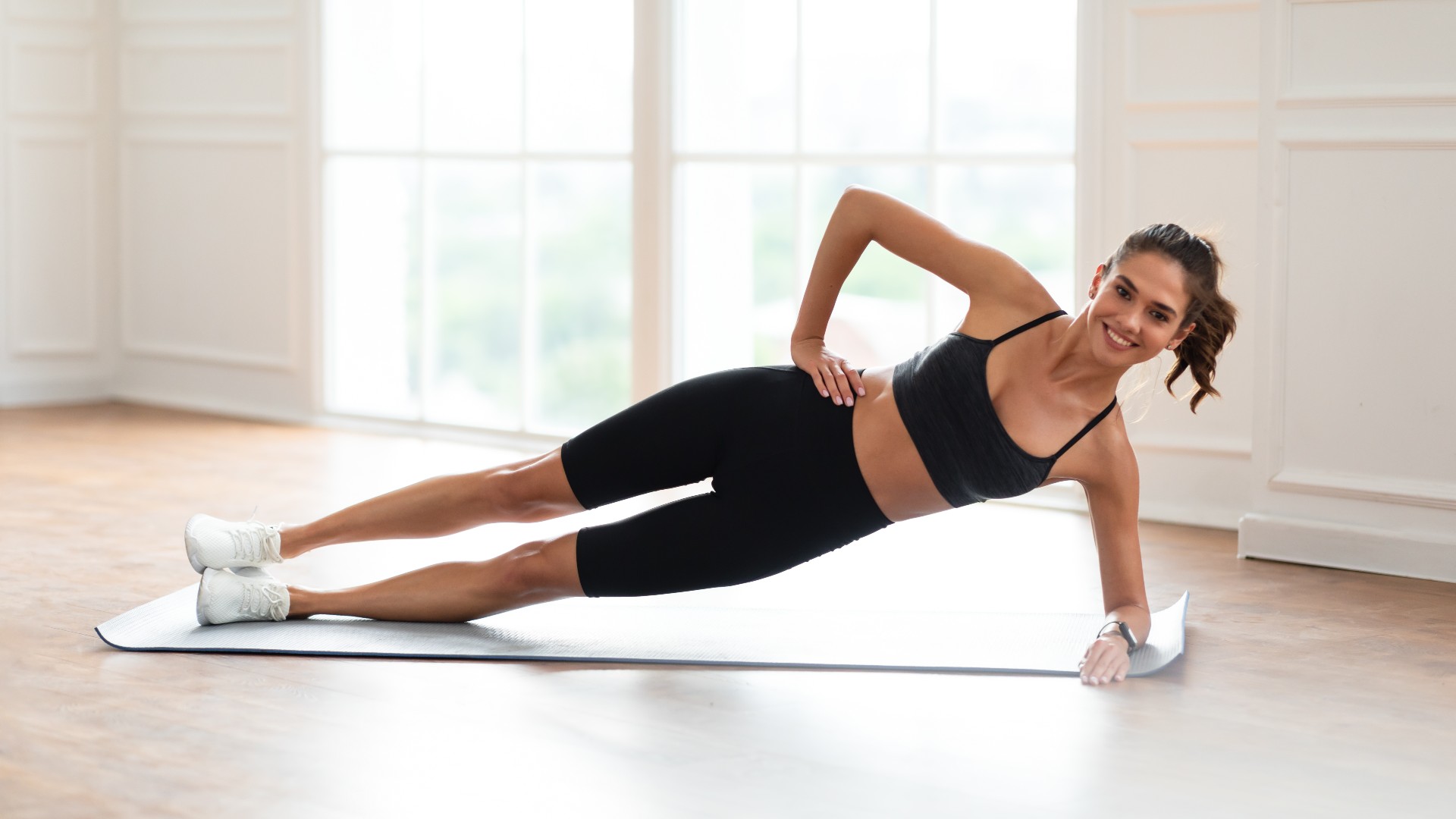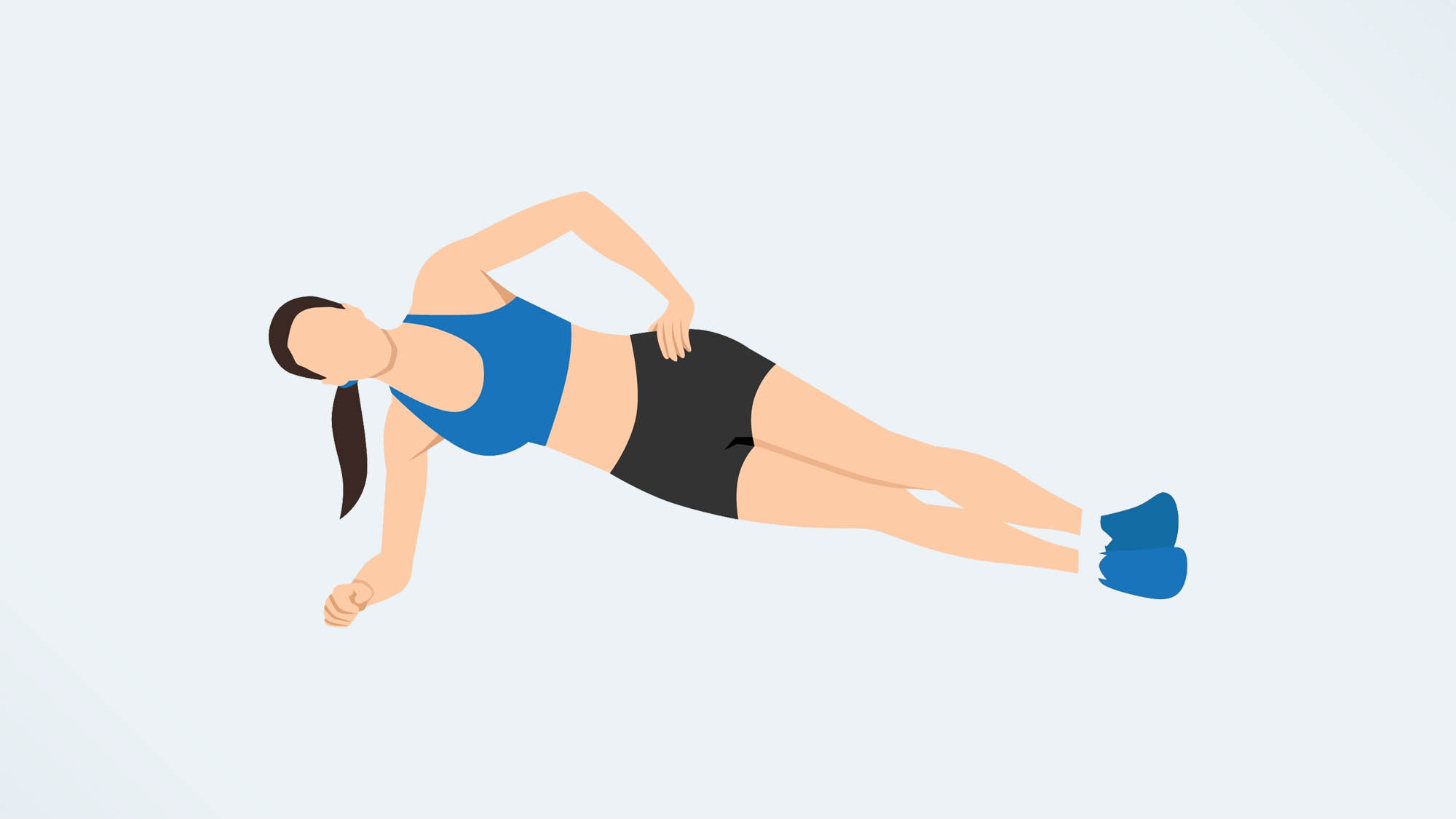
Side plank dips combine the side plank and hip dips into one plank variation, sculpting stronger core muscles and building strength in your back and shoulders. I did 70 reps per side every day for one week to see what the move could do for my waist (spoiler, sadly, no dramatic changes in seven days).
To do a side plank hip, simply hold a side plank with your elbow resting beneath your shoulder, then slowly lower your hip to the floor and drive it back up again. Of course, the move takes more work than that to keep your body stable, but do it safely, and you’ll strengthen various muscle groups at once.
The exercise is one of the best plank variations for strengthening your core, but what could 70 reps per side do after one week? Here’s what happened when I put them to the test and why we should all approach high reps with caution.
Are side plank dips effective?

Side plank dips primarily target your oblique muscles, formed of deeper internal and superficial external obliques. These muscles run down your waist from the rib to the pelvis and support rotation and flexion of the trunk while protecting the spine.
But the move isn’t a one-trick pony. Plank dips also activate your shoulders, deep stabilizer muscles in your hips and trunk, and the back muscles, including your latissimus dorsi (lats). You’ll also work your glutes during the move, engaging the outer glutes — the gluteus medius.
Although a plank and its popular variations develop your core muscles, sculpting definition in your midsection comes down to body fat percentage. You can’t spot-reduce fat, but if your goal is more visible abs, consider other factors like diet, stress management and sleep quality.
I also recommend adding compound exercises into your strength program, as these multi-joint moves recruit more muscles and require more output from your body, burning more calories. Think deadlifts or squats, for example.
How to do side plank dips

Try practicing bodyweight side planks first, and developing an ab workout routine, before graduating to hip dips. If you don’t train your core muscles regularly, adding hip dips puts more pressure on your lower back and could result in injury.
- Start laying on your side on an exercise mat
- Extend and stack your legs and rest your forearm flat on the floor. Keep your shoulder directly over your elbow
- Engage your abs and lift your hips and knees off the floor. Try to maintain a straight line from your head to your feet. Only your forearm and bottom foot should touch the ground
- Keeping your chest forward-facing, lower your hip to the ground. Pause, then drive your hip up high. Repeat, then swap sides.
I did 70 side plank dips every day for one week — here are my results
Here’s how I got on.
Day 1
I’m familiar with side plank dips but I don’t do them very often. So, I was looking forward to working on my core differently and targeting my side body with more focus.
I opted for all 70 reps on one side, split between two sets of 35 reps, then switched to the other side. Game on — my waist and shoulders were already on fire and I felt cooked after my first set of reps. It could be a long week.

Day 2
I played it simple for the first two days, focusing solely on form and ensuring my chest stayed forward-facing without swinging through the hips. Instead, I lowered with control, then drove up high with power, taking my time on each rep. The challenge — 140 reps a day — was already proving hard work for my sides.
If you’re new to the exercise and still want to give it a go, there are two great ways to scale back. First, step your top foot in front of your bottom foot, which instantly provides more support. Your second option is to drop your bottom knee to the ground.
Days 3 and 4
On day three, the movement pattern felt more comfortable, so I added weight to my hip. For a rundown on how to do this safely, our fitness editor did weighted side planks every day for a week and shared how to scale them.
Immediately, I squeezed my stomach and glutes more to stabilize my body. A hex dumbbell is less cumbersome to control than kettlebells, but the best adjustable dumbbells are also a great home workout solution if you need variety. After day four, I dropped by 2kg as my lower back began to speak up.
As my rep count climbed, I noticed my top hip beginning to turn out. Instead, I focused on squaring my chest and keeping my gaze on a stationary object to stay balanced — in yoga, this is called drishti — and I can confirm from this challenge that my excitable two-year-old dog doesn’t count as ‘stationary.’
Days 5 & 6
As the week progressed, my waist felt hard-worked. The majority of my exercise routine includes functional training like CrossFit, and it’s rare to isolate these muscle groups during classes.
It felt good to use my muscles differently and combined with CrossFit and yoga, my upper body felt torched after a week of attention. Of course, physically, my waist looked the same, and you won’t notice drastic changes in a week, but at least I felt good.
Day 7
By day seven, my shoulders had had enough. Your rotator cuffs (a group of muscles that surround the shoulder joints) provide shoulder stability during side plank dips, and I have issues on my left side from a previous injury.
Side planks can aggravate shoulder injuries, especially as you weight-bear on one side. It’s crucial to note that what works for me doesn’t mean it’s safe for everyone, and high reps every day could make matters worse. Always work to your ability and stop if you notice pain or weakness. For me, day seven came at the right time.
Verdict
Although side planks are an isometric exercise (without movement), this variation torches your waist and demands work from your chest, shoulders, arms and back; these muscles support posture, and strengthening them could help build a healthier spine, but shouldn’t mean putting your shoulders through the wringer.
To practice hip dips with better stability, our fitness editor provides the low down on plank hip dips here, and I encourage using the tips above to provide support. We love our fitness challenges at Tom’s Guide, but you shouldn’t over-train your muscles by repeating the same exercise daily.
Check out some exercises our fitness team enjoys below for ideas around rest and recovery.







